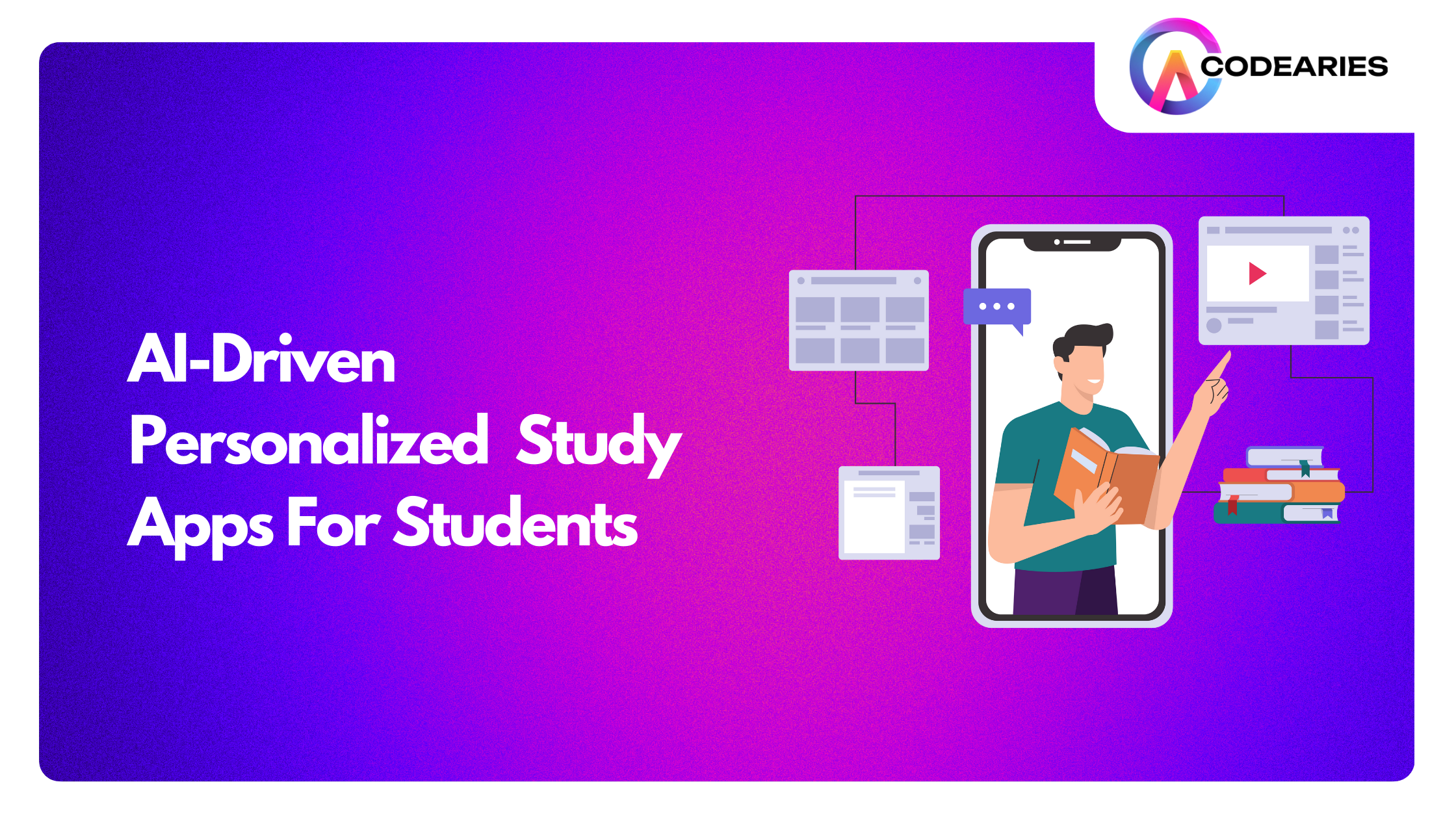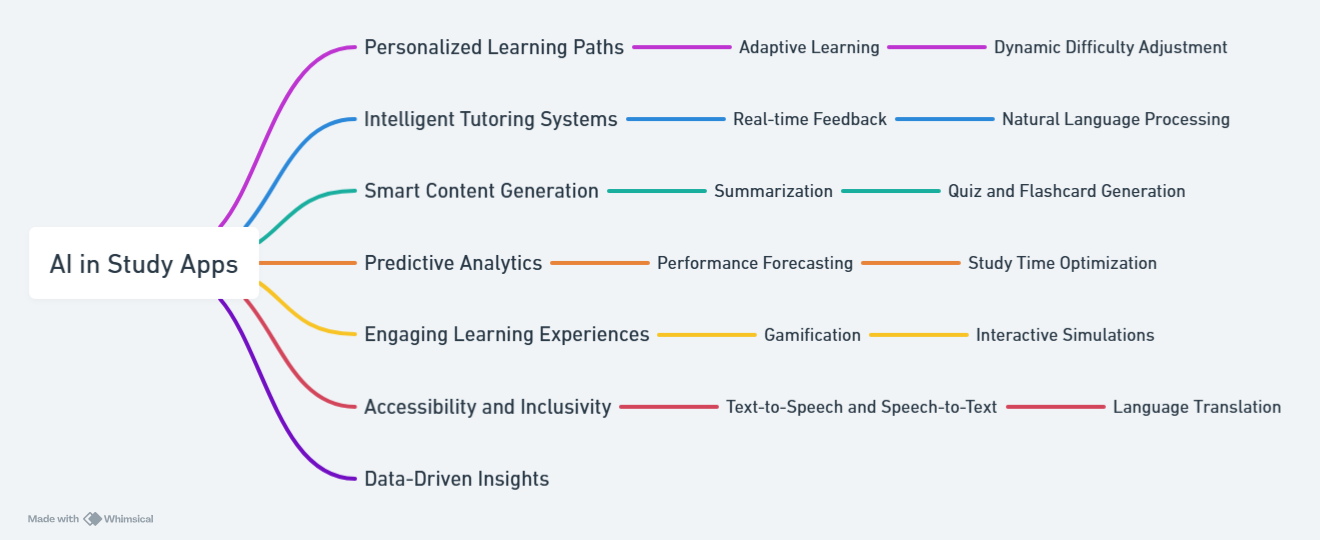
AI-driven personalized study apps are transforming education by making learning more efficient, flexible, and engaging. These innovative tools harness the power of artificial intelligence to create tailored learning experiences that cater to the individual needs, strengths, and preferences of each student. Unlike traditional educational methods that often adopt a uniform approach, AI-driven apps adapt dynamically, providing targeted support that significantly enhances understanding and retention.
The Role of AI in Education
AI’s impact on education is profound, reshaping how students learn. By utilizing AI, study apps can evaluate a student’s progress in real time, delivering personalized content, timely feedback, and immersive learning experiences that traditional methods can’t match. These apps accommodate diverse learning styles, whether a student learns best through visual, auditory, or kinesthetic methods, thereby streamlining the knowledge acquisition process. The global AI in education market size is estimated to have stood at USD 5,440.5 million in 2024, and it is expected to advance at a compound annual growth rate of 47.2% during 2024–2030, to reach USD 55,444.6 million by 2030.
How AI Powers Study Apps
AI is transforming education by enhancing study apps to create tailored learning experiences. Here’s an overview of how this technology functions:
Adaptive Learning
- Personalized Content: AI analyzes a learner’s performance to customize questions, adjusting difficulty to align with their understanding.
- Adaptive Pacing: The system can modify the speed of learning, slowing down for complex topics or accelerating through areas where the user excels.
Intelligent Tutoring
- Question Generation: AI can formulate relevant and challenging questions that test a user’s knowledge effectively.
- Feedback and Explanations: After incorrect answers, AI provides detailed explanations and constructive feedback, helping users understand their mistakes and learn from them.
Natural Language Processing (NLP)
- Interactive Q&A: AI utilizes natural language processing to understand user queries, facilitating easier communication and clarification.
- Language Practice: For language learners, AI enables practice in speaking and writing through interactive exercises that simulate real conversations.
Data Analysis and Insights
- Progress Monitoring: AI continuously tracks user performance, identifying strengths and areas needing improvement.
- Tailored Recommendations: Based on data analysis, AI suggests additional resources or personalized learning paths that align with the user’s needs.
Gamification
- Engaging Challenges: AI designs personalized challenges and rewards to maintain user engagement and motivation.
- Dynamic Game Difficulty: The difficulty of games adjusts based on user performance, ensuring that tasks remain appropriately challenging and stimulating.
Through these sophisticated features, AI-driven study apps provide a customized and engaging learning experience, allowing students to learn at their own pace while receiving the support they need to succeed.
How Teachers Can Use AI-Driven Study Apps
AI-driven study apps offer educators powerful tools to enhance their teaching methods and support student learning. Here are several strategies for effectively utilizing these applications:
Tailored Learning Plans
- Assessing Individual Needs: Educators can harness AI analytics to pinpoint specific strengths and weaknesses of each student.
- Crafting Customized Plans: Using these insights, teachers can develop personalized learning plans that directly address each student’s unique requirements.
Enhancing Classroom Instruction
- Additional Practice: AI-powered apps can serve as a resource for extra practice, reinforcing concepts covered in class.
- Differentiated Instruction: These apps enable teachers to tailor their approach, offering additional support to struggling students or advanced challenges to those who are excelling.
Homework Assignment and Progress Monitoring
- Streamlined Assignments: Educators can assign homework or practice tasks directly through the app, simplifying the process.
- Progress Tracking: The app allows teachers to monitor student performance over time, providing insights into areas needing further attention.
Focused Feedback
- Instantaneous Feedback: AI-driven applications can offer immediate feedback on student submissions, helping learners quickly recognize and rectify errors.
- Personalized Responses: Teachers can utilize the app to deliver tailored feedback based on individual student performance, fostering deeper understanding.
Encouraging Independent Learning
- Self-Paced Exploration: Students can use the app to delve into subjects at their own pace, promoting self-directed learning.
- Skill Acquisition: AI-powered study tools can help students cultivate essential skills such as self-discipline, time management, and critical thinking.
Ongoing Professional Development
- Staying Informed: Educators can utilize AI-driven apps to keep abreast of the latest trends and techniques in teaching.
- Reflective Practice: These tools can provide valuable insights and data that help teachers refine and enhance their instructional strategies.
AI for Functional Needs and Inclusive Learning
AI has the potential to revolutionize education for students with disability by providing personalized and adaptive learning experiences. It modifies educational materials to fit individual needs and adjusts learning pace, accommodating various abilities. AI also enhances assistive technology, enabling voice interaction for students with speech impairments and converting text to audio for those with visual challenges. With predictive analytics, AI can identify early signs of learning difficulties, allowing for timely interventions. Additionally, it supports social-emotional learning through tailored activities and emotional recognition. By ensuring accessibility and offering data-driven insights for teachers, AI fosters inclusive learning environments that empower all students to succeed.
The Global Impact of AI-Driven Study Apps
AI-driven study apps are transforming global education by making quality learning accessible and affordable, particularly in remote areas. They personalize educational experiences, enhancing learning outcomes and supporting language acquisition through immersive practices. These apps promote lifelong learning, helping individuals continuously develop skills to adapt to evolving job markets. By bridging the digital divide and fostering cultural exchange, they empower underserved communities and promote understanding among diverse populations. Overall, AI-driven study apps are democratizing education and driving significant global change, with the potential for even greater innovations as technology advances.
The Future of AI in Education and Study Apps
The integration of AI into education is revolutionizing the learning landscape, creating exciting opportunities:
Tailored Learning Experiences
- Adaptive Algorithms: AI will customize content and pacing based on individual learning styles and preferences.
- Proactive Support: Predictive analytics will identify potential challenges, helping students stay on track.
Intelligent Tutoring Systems
- Personalized Mentorship: AI tutors will provide real-time assistance and instant feedback tailored to each student’s needs.
- Emotional Insight: By understanding students’ emotional responses, AI can foster a more supportive learning environment.
Immersive Technologies
- AR and VR Experiences: AI-driven augmented and virtual reality will create engaging, interactive learning environments.
- Hands-On Practice: Simulated scenarios will offer practical skill development in a safe setting.
Advancements in Natural Language Processing
- Conversational AI: Future systems will engage in more natural, human-like conversations.
- Language Learning Enhancement: NLP improvements will allow learners to practice speaking and listening skills in realistic contexts.
As AI continues to evolve, its potential to transform education and empower learners is limitless.
Conclusion
AI-driven study apps are transforming education by providing personalized and adaptive learning experiences tailored to each student’s needs. These tools enhance comprehension through adaptive learning, instant feedback, and engaging challenges. For educators, AI offers valuable insights for creating customized learning plans and fostering independent study.Furthermore, AI plays a crucial role in supporting students with support needs by facilitating early intervention and ensuring inclusive learning environments. By embracing AI in education, we can create effective, engaging, and supportive settings that empower all learners to thrive.
FAQs
Which AI is Free for Students?
Several AI tools are available for free to students. Khan Academy offers instructional videos and practice exercises, utilizing AI to create personalized learning paths based on student progress. Duolingo adapts language lessons to each learner’s pace, making it engaging and effective. Quizlet provides free flashcards and study sets, with AI features that focus on weaker areas. Socratic by Google assists with homework by offering AI-generated explanations. Lastly, Google Classroom integrates AI to streamline assignment management and track student progress.
What is the Best AI for Education?
The “best” AI for education varies based on needs, but notable options include Edmodo, which enhances communication between students and teachers. Moodle is an open-source platform that personalizes learning experiences. IBM Watson Education tailors educational content with insights and recommendations. Microsoft Education Tools incorporates AI in applications like OneNote and Teams to facilitate collaboration and personalized learning. Each of these platforms provides unique features to enhance the educational experience.
How to Use AI for Exam Preparation?
AI can significantly aid exam preparation by creating personalized study plans through apps like Quizlet and Khan Academy, which focus on areas needing improvement. Utilizing practice tests from platforms like Prodigy helps mimic actual exam conditions. Instant feedback from these apps allows students to identify mistakes and learn quickly. AI can also suggest specific topics for revision based on performance data, ensuring a targeted study approach. Additionally, gamification elements in some apps make studying more enjoyable and motivating.
How is AI Used for Personalization?
AI enhances personalization in education by utilizing adaptive learning, which tailors content and pacing based on individual student data. It delivers dynamic content, suggesting topics aligned with a student’s understanding. Real-time feedback from AI systems addresses specific errors, deepening comprehension. AI can accommodate different learning styles, offering resources that suit each student’s preferences. Continuous progress tracking allows for dynamic adjustments in recommendations, ensuring students remain challenged yet supported throughout their learning journey.


